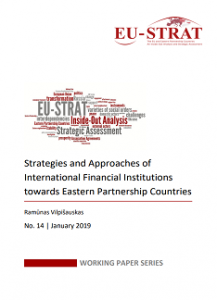EU-STRAT Working Paper No. 14 looks at the approach of the International Monetary Fund and World Bank to Belarus, Moldova, and Ukraine.
Click on the title or the picture below to download the PDF.
Author: Ramūnas Vilpišauskas
Abstract:
 The paper focuses on the strategies and approaches of the main international financial institutions (IFIs) – the International Monetary Fund and the World Bank – towards reforms in the Eastern Partnership (EaP) countries, namely, Belarus, Moldova and Ukraine. It assesses the main principles, goals, policy instruments, conditionalities and the target groups of these IFIs in their interaction with the authorities of the three countries and the implementation of country support programs.
The paper focuses on the strategies and approaches of the main international financial institutions (IFIs) – the International Monetary Fund and the World Bank – towards reforms in the Eastern Partnership (EaP) countries, namely, Belarus, Moldova and Ukraine. It assesses the main principles, goals, policy instruments, conditionalities and the target groups of these IFIs in their interaction with the authorities of the three countries and the implementation of country support programs.
The two core questions that guide the analysis are, first, the role of IFIs in supporting economic and institutional reforms, which aim at transforming limited access orders into open access orders, and, second, these IFIs’ interaction with other external actors, such as the European Union, that are present in the EaP countries. In addition to the traditional advice on fiscal consolidation and structural reforms, the IFIs have been focused on banking and energy reforms, as rent-seeking and corruption were especially wide-spread in these sectors. Increasing focus on policies aimed at reducing corruption, in particular in the case of Ukraine, is among the most notable features of the IFIs’ operation in those countries. However, such measures often risked being implemented only ‘on paper’, especially after the financial pressure on the ruling elite in recipient countries decreased. The attempts to broaden the political and societal support for agreed policy reforms have become another exceptional element of the support strategy practiced by the IFIs in the EaP countries, in particular in Ukraine. In the latter case, the negotiated arrangements were discussed not only with key figures from the ruling elite and responsible institutions but also with the opposition, societal activists and other important stakeholders. Despite attempts at broadening reform ownership and coordination with other external donors, the actual effects of the IFIs’ strategies on transition reforms have been limited, as evidenced by a history of half-implemented and sometimes reversed policy measures.
